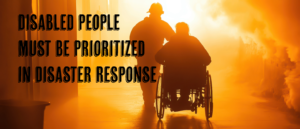When we hear the term “natural disaster,” we often think of uncontrollable forces of nature—fires, hurricanes, floods. But the truth is, these events are not purely “natural.” They are crises exacerbated by human decisions, or the lack thereof, to adequately prepare, respond, and protect vulnerable communities. Disabled people, in particular, are often among the first to be sacrificed when systems fail. This is not a result of nature’s cruelty but rather society’s negligence, rooted in an ongoing history of ableism and eugenics.
The ongoing wildfires in Los Angeles have tragically claimed the lives of many, including disabled individuals whose deaths could have been prevented with better planning and care. Anthony Mitchell, an amputee who used a wheelchair, and his son Justin, who was born with cerebral palsy, lost their lives because they were unable to evacuate in time. Rory Callum Sykes, a Blind advocate and co-founder of Happy Charity, also perished when the flames overtook his Malibu estate. These deaths are not simply the result of a raging fire—they are a direct consequence of inadequate infrastructure, inaccessible evacuation procedures, and a society that consistently places disabled people at the bottom of its priority list.
Disasters are not neutral. They expose and magnify the inequities that already exist within a society. For disabled people, these inequities are fatal. Emergency systems are often designed for able-bodied individuals, assuming that everyone has the physical capacity to flee quickly, the resources to relocate, and access to clear communication about evacuation orders. For disabled individuals, these assumptions are dangerous and deadly. Wheelchair users, for example, may struggle to navigate uneven terrain or stairs, while those with sensory disabilities may be unable to process critical information in time.
This systemic neglect is deeply tied to a history of eugenics—the belief that certain lives are more valuable than others. Time and again, society has shown that disabled lives are considered expendable in moments of crisis. This became glaringly apparent during the early days of the COVID-19 pandemic. As the virus spread and healthcare systems were overwhelmed, disabled people were often denied care. Some triage policies explicitly deprioritized disabled individuals, treating their lives as less worthy of saving. Public discourse revealed a horrifying willingness to sacrifice disabled people in the name of “getting back to normal.” Phrases like “only the vulnerable are at risk” and “we can’t shut down the economy for them” laid bare the deep-rooted ableism in our society.
Today, that same disregard continues as masking and other COVID-19 protections are abandoned, leaving disabled people—along with the elderly and immunocompromised—at higher risk. These choices reflect a eugenicist mindset that prioritizes the comfort and convenience of the majority over the survival of the marginalized. They echo the same logic that leads to disabled people being left behind during disasters like the Los Angeles wildfires.
The deaths of the elderly and disabled in the LA Fires are not isolated incidents; they are emblematic of a broader failure to value disabled lives. According to the United Nations, disabled people are two to four times more likely to die in disasters than their non-disabled peers. These statistics are not inevitable. They are the result of policy choices, systemic ableism, and a lack of meaningful inclusion in disaster preparedness planning.
Disaster response systems must center disabled people, not treat them as afterthoughts. This starts with creating accessible evacuation plans that consider the diverse needs of the disabled community. Transportation systems must be equipped to accommodate wheelchairs, stretchers, and other mobility aids. Emergency alerts should be provided in multiple formats—such as text, audio, and sign language—to ensure they reach everyone. Communities should engage disabled people in planning processes, drawing on their expertise to design systems that work for everyone.
The narrative of sacrifice—of disabled people as expendable in moments of crisis—must end. Disabled lives are not less valuable. They are not collateral damage. These preventable deaths should serve as a wake-up call to society. We cannot control the forces of nature, but we can control how we prepare for and respond to them. By centering disabled people in disaster planning, we not only save lives but also affirm the inherent worth and dignity of every individual. Disabled people must be the first saved—not the first sacrificed.

